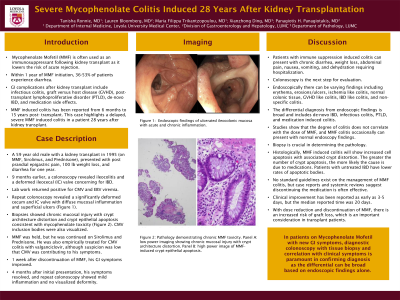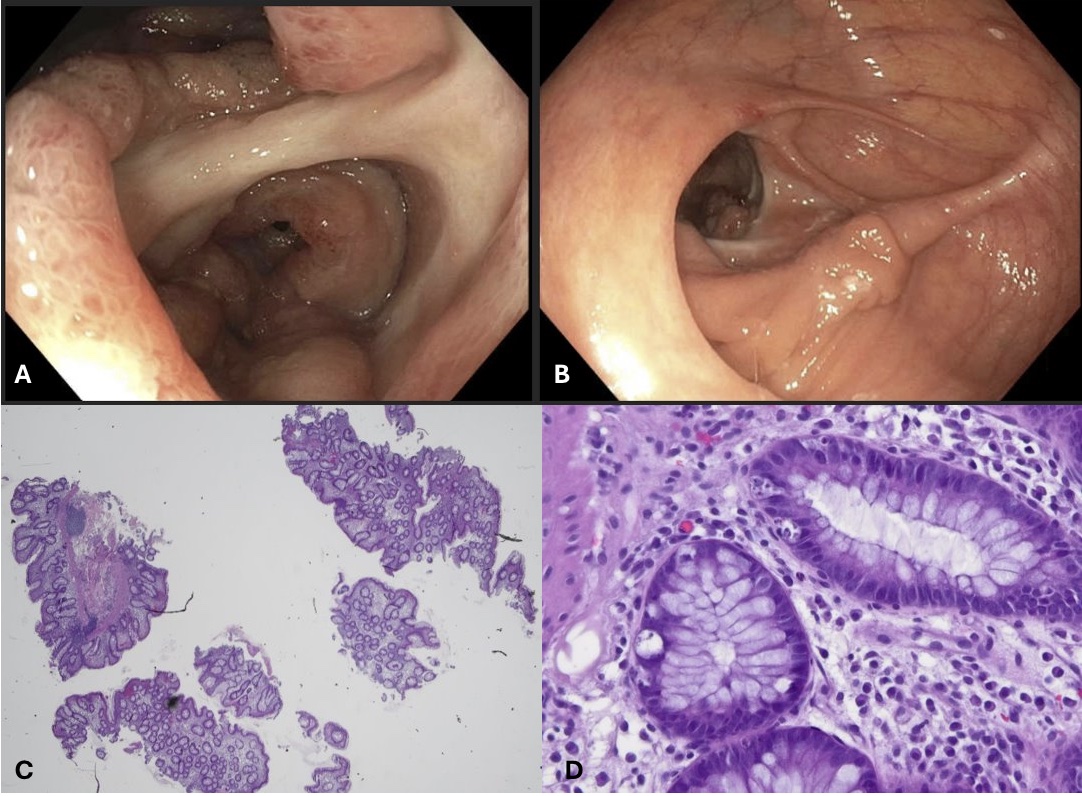Tuesday Poster Session
Category: Colon
P3676 - Severe Mycophenolate Induced Colitis 28 Years After Kidney Transplantation
Tuesday, October 29, 2024
10:30 AM - 4:00 PM ET
Location: Exhibit Hall E

Has Audio
.jpg)
Tanisha Ronnie, MD
Loyola University Medical Center
Chicago, IL
Presenting Author(s)
Tanisha Ronnie, MD1, Lauren Bloomberg, MD1, Filippa Trikantzopoulou, MD1, Abhishek Alur, MD1, Xianzhong Ding, MD1, Panagiotis H. Panagiotakis, MD2
1Loyola University Medical Center, Chicago, IL; 2Loyola University Medical Center, Chicago, MN
Introduction: Gastrointestinal (GI) complications following kidney transplant can include infectious colitis, medication adverse effects, graft versus host disease, post-transplant lymphoproliferative disorder (PTLD), and de-novo inflammatory bowel disease (IBD). Mycophenolate mofetil (MMF) is increasingly utilized post transplant as it lowers the risk of acute rejection. However, 36-53% of patients on MMF experience diarrhea within 6-12 months of drug initiation. Rare cases of MMF induced colitis have been reported within 6 months to 15 years post-transplant. We present a case of delayed, severe MMF induced colitis in a patient 28-years post-transplant.
Case Description/Methods: A 59-year-old male with a history of kidney transplant in 1995 on MMF, Sirolimus, and Prednisone, H-pylori s/p eradication, and GERD presented with a 100-pound weight loss, post-prandial epigastric pain, and chronic diarrhea. A colonoscopy 9 months prior revealed ileocolitis and a deformed ileocecal (IC) valve suggesting IBD. The patient was lost to follow up until presenting for ongoing progressive GI symptoms. Initial evaluation was notable for cachexia, and CMV and EBV viremia on labs. Further evaluation with a colonoscopy revealed a significantly deformed cecum and IC valve with diffuse mucosal inflammation and superficial ulcers (Figure A-B) that endoscopically appeared as if he’d had prior colorectal surgery. Biopsies confirmed chronic mycophenolate toxicity with superimposed CMV colitis (Figure C-D). MMF was discontinued, and empiric treatment with Valgancyclovir was initiated under the guidance of the renal transplant and infectious disease teams, resulting in gradual symptomatic improvement. Despite initial improvement, ongoing malnutrition necessitated PEG tube placement for enteral feeds. Four months later, the patient’s symptoms resolved, PEG was removed, and follow up colonoscopy showed improvement with only mild inflammation and no visualized deformity.
Discussion: This case highlights a delayed presentation of severe MMF induced colitis with co-existing CMV colitis 28 years post kidney transplant. Endoscopically, MMF induced colitis can mimic PTLD, de-novo IBD, and infectious colitis. However, characteristic histologic features including increased cell apoptosis and crypt distortion are classic for MMF toxicity and can aid in diagnosis. In patients on MMF with new GI symptoms, colitis should be on the differential, and colonoscopy with biopsy is necessary to ensure early diagnosis and prevent severe complications.

Disclosures:
Tanisha Ronnie, MD1, Lauren Bloomberg, MD1, Filippa Trikantzopoulou, MD1, Abhishek Alur, MD1, Xianzhong Ding, MD1, Panagiotis H. Panagiotakis, MD2. P3676 - Severe Mycophenolate Induced Colitis 28 Years After Kidney Transplantation, ACG 2024 Annual Scientific Meeting Abstracts. Philadelphia, PA: American College of Gastroenterology.
1Loyola University Medical Center, Chicago, IL; 2Loyola University Medical Center, Chicago, MN
Introduction: Gastrointestinal (GI) complications following kidney transplant can include infectious colitis, medication adverse effects, graft versus host disease, post-transplant lymphoproliferative disorder (PTLD), and de-novo inflammatory bowel disease (IBD). Mycophenolate mofetil (MMF) is increasingly utilized post transplant as it lowers the risk of acute rejection. However, 36-53% of patients on MMF experience diarrhea within 6-12 months of drug initiation. Rare cases of MMF induced colitis have been reported within 6 months to 15 years post-transplant. We present a case of delayed, severe MMF induced colitis in a patient 28-years post-transplant.
Case Description/Methods: A 59-year-old male with a history of kidney transplant in 1995 on MMF, Sirolimus, and Prednisone, H-pylori s/p eradication, and GERD presented with a 100-pound weight loss, post-prandial epigastric pain, and chronic diarrhea. A colonoscopy 9 months prior revealed ileocolitis and a deformed ileocecal (IC) valve suggesting IBD. The patient was lost to follow up until presenting for ongoing progressive GI symptoms. Initial evaluation was notable for cachexia, and CMV and EBV viremia on labs. Further evaluation with a colonoscopy revealed a significantly deformed cecum and IC valve with diffuse mucosal inflammation and superficial ulcers (Figure A-B) that endoscopically appeared as if he’d had prior colorectal surgery. Biopsies confirmed chronic mycophenolate toxicity with superimposed CMV colitis (Figure C-D). MMF was discontinued, and empiric treatment with Valgancyclovir was initiated under the guidance of the renal transplant and infectious disease teams, resulting in gradual symptomatic improvement. Despite initial improvement, ongoing malnutrition necessitated PEG tube placement for enteral feeds. Four months later, the patient’s symptoms resolved, PEG was removed, and follow up colonoscopy showed improvement with only mild inflammation and no visualized deformity.
Discussion: This case highlights a delayed presentation of severe MMF induced colitis with co-existing CMV colitis 28 years post kidney transplant. Endoscopically, MMF induced colitis can mimic PTLD, de-novo IBD, and infectious colitis. However, characteristic histologic features including increased cell apoptosis and crypt distortion are classic for MMF toxicity and can aid in diagnosis. In patients on MMF with new GI symptoms, colitis should be on the differential, and colonoscopy with biopsy is necessary to ensure early diagnosis and prevent severe complications.

Figure: Figures A-B: Endoscopic findings of ulcerated ileocolonic mucosa with acute and chronic inflammation. Figure C: Biopsy of colon with H&E stain at 40x magnification showing chronic mucosal injury with crypt architecture distortion. Figure D: Biopsy of colon with H&E stain at 200x magnification showing MMF-induced crypt epithelial apoptosis.
Disclosures:
Tanisha Ronnie indicated no relevant financial relationships.
Lauren Bloomberg indicated no relevant financial relationships.
Filippa Trikantzopoulou indicated no relevant financial relationships.
Abhishek Alur indicated no relevant financial relationships.
Xianzhong Ding indicated no relevant financial relationships.
Panagiotis Panagiotakis indicated no relevant financial relationships.
Tanisha Ronnie, MD1, Lauren Bloomberg, MD1, Filippa Trikantzopoulou, MD1, Abhishek Alur, MD1, Xianzhong Ding, MD1, Panagiotis H. Panagiotakis, MD2. P3676 - Severe Mycophenolate Induced Colitis 28 Years After Kidney Transplantation, ACG 2024 Annual Scientific Meeting Abstracts. Philadelphia, PA: American College of Gastroenterology.
